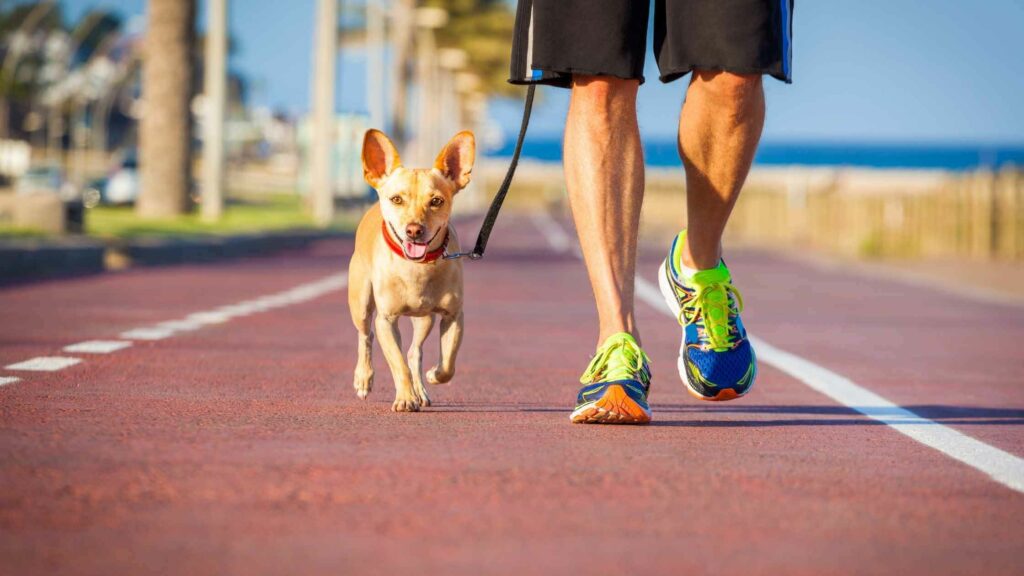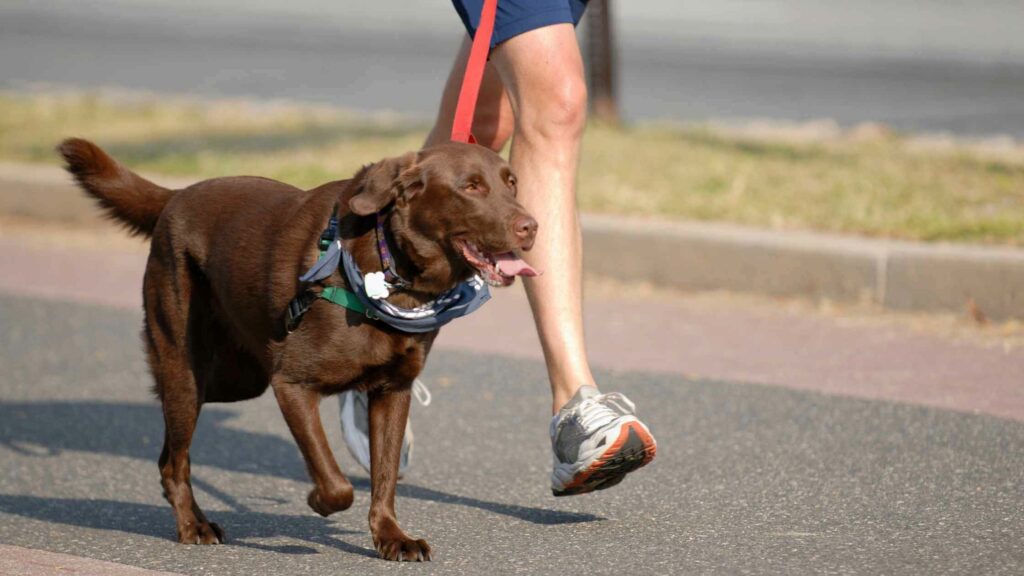
You’re a runner and are seriously considering running a marathon with your dog, but can a dog run a marathon? In that case, this is an important post to read carefully for your dog’s best health and safety!
Yes, dogs can run a full marathon of 27 miles (43 km), and they can also run a half-marathon of 10 miles (16 km) or less. You must properly train your dog to run a marathon, however, just like you would train yourself to run that marathon. Training will involve physical training but also obedience training.
Has a dog ever completed a marathon?
There are records of dogs completing marathons before. There are many marathons that encourage racers to bring their dogs with them! Most dogs aren’t counted as official registrants, so their completion is marked mostly as an add-on to their human.
How many miles can a dog run?
Dogs are exceptional runners and can easily outpace humans if given a chance. The number of miles or kilometers a dog can run will vary greatly depending on training and the dog’s breed, health, and attention to their task, amongst other details.
Huskies are thought to be the best runners for endurance runs. Breeders and specialists estimate these dogs can run up to 150 miles (241 km) per day. Remember that huskies have been bred specifically for long-distance running, genetically speaking.
Below we’ll go into more detail about understanding your dog’s limits and working within them to keep their health front of mind.
Can a dog run 20 miles?
Yes, a dog can run 20 miles (32 km) if they are trained to do so. A standard marathon is 27 miles (43 km), so a 20-mile run will be an easily doable run for a dog who is prepared for this event. There are even some dogs who could just run 20 miles without training. But, putting them to the test this way is not recommended.
Can a dog run a half marathon?
Dogs can run half-marathons easily since they are well within their comfortable endurance running limits. The same need for training still applies, though.
Can my dog run a 10k?
As you might be able to guess, this is also possible since this is shorter still than a half-marathon. This is a great “warm-up” for pet parents that want to introduce their dogs to marathon running.
Can a dog run a 5K?
You already know the answer to this one, right? Exactly. Dogs can easily run something this “short.” If your dog is new to the world of professional running, or you are. In that case, this is a great, short marathon that you can take on together to see how you perform when the pressure is on.
How fast would a dog run a marathon?
Dogs are much faster than humans, so experts agree that a dog can run a marathon much faster than the fastest human if they were to run the course on their own.
Most marathons require dogs to be on a leash, however. Some wonder how fast a dog could run a marathon on their own if they were properly trained to run the course on their own with no human directing them.
Can a dog win a marathon?
This is a complicated question. After all, we just read above that dogs can technically run faster than humans if trained to run the course themselves. So, if you’re talking about a literal situation where it’s human vs. dog, a dog would most likely win a marathon.
However, most marathons that allow dogs make it clear that the humans are the ones that win the marathon as far as ranking is concerned. Dogs are just “along for the ride.”

Can too much running hurt your dog?
You can certainly hurt your dog if they run too much. They’ll suffer complications like malnutrition (from too much calorie burning), arthritis and elbow or hip dysplasia, and even muscle damage just by simply overdoing it.
This is part of why properly training your dog is so important. When you give their body time to train and adjust to running distances with you, you’ll be able to help them feel at their best and strongest to take on the half-marathon or full marathon.
How much running is too much for a dog?
Some breeds will be able to run easier and longer than others, as you can probably guess! For best results, you’ll want to check with your vet and/or breeder to have a professional’s opinion on your dog’s breed and health.
You can also find calculators online that will help you to get a range of what you should expect. These are just meant as general averages only, though.
Regardless of what a professional tells you or what you get on the calculator, you definitely need to keep an eye on your dog’s actual reaction to running. Every dog is different, and these estimates are meant as guidelines rather than minimums.
Listen to your dog’s needs and don’t make them run any more than they can do, even if your vet or calculator has said differently.
Lastly, the range you get for your dog breed is accurate with the assumption that you’ve gotten your dog used to it. You can’t just expect them to run 20 miles (32 km) right away.
What breed of dog can run long distances?
We talked briefly about huskies already, but they are definitely top on the list as the best dogs for running long distances. Also high on the list will be all types of Labrador Retrievers and Border Collies. These dogs love to run, and they’ll be happy enough to take on a long-distance run with their favorite human.
What is the best running dog?
If you’re looking for the actual ranking for the best running dog, you’ll find it a solid tie between huskies and various types of collies. If you want to know what is best when investing in a dog, talk to breeders of both dog breeds and your vet!
Do dogs enjoy running?
Most dogs do enjoy running, as hinted above. Humans often move far too slow for a dog’s liking. So, when they get the chance to use their pent-up energy and stamina to run long-distance and match your pace, they will be happy to do so!
However, some pet parents who start to train their dog in long-distance running may actually find that their dog likes running…up to a point. Maybe that point is lower than pet parents would like their dog to participate in a half marathon. However, as mentioned above, you must meet your dog where they are and work within what they want, and can, do!
At what age should you stop running with your dog?
Any time you notice your dog having health concerns from running (particularly in joint pain or difficulty breathing), you can consider it time for your dog to “retire” from running. That age will vary depending on your dog’s health, but most experts recommend age 12+ would be in the “danger zone.”
On the other end of things, you should wait until your dog is 14 months old before you introduce them to long-distance running. You can start exercising with them when they are 6 months old but don’t allow them to run long-distance before 14 months of age. It could impact their long-term joint health and general health. Their bodies are still developing and growing, and too much strenuous exercise will be harmful to their health!

Can I run with my dog every day?
You can certainly run with your dog every single day! Many pet parents do this as part of a shared exercise routine. You’ll still want to be careful doing it before your dog is 6 months old, as mentioned above. However, running with your dog is a great way to get dedicated time for bonding, exercise, and training for marathons later!
How to train a dog to run a marathon
Now that you know how your dog can take on a half marathon or a full marathon with you, let’s focus on how you can train your dog to actually run that marathon with you! Your focus details will include:
- Obedience training
- Leash training
- Introducing longer distances at a careful pace
- Providing a good diet
- Testing their behavior on trails
Obedience training
If your dog isn’t going to listen to basic commands, don’t even think about taking them on a marathon with you! Your dog must be firmly under your control when you are running a marathon, even if your dog gets distracted. Teach commands such as “stay,” “come,” “follow,” etc.
Leash training
Of course, you’ll want to have your dog on a leash for the marathon unless you are participating in an off-leash marathon. Get your dog used to running on a leash that works for them and you. This keeps your dog under your control but also helps you and your dog have the room you need to participate in the marathon properly.
Get them used to the leash, and then combine that with the commands above to see how your dog responds. You two must be a “well-oiled machine” for a safe and successful marathon together.
Introducing longer distances at a careful pace
As you’re training your dog, take the same approach for their running distance as you would for yours. Get them used to regular distances first, then gently and slowly increase that distance. They’ll start to understand just what is required for those longer distances and adjust. Continue that until you get to the marathon distance itself.
After that, you’ll want to start changing the terrain to match what you can expect on the marathon trails (more on that shortly).
Providing a good diet
You’ll need to ensure that your dog is getting a properly balanced diet, including protein and calories. Talk to your vet about recommending a specialized diet for your dog based on training them for a marathon. This will help protect their joints and muscle mass, working hard at ensuring that your dog has their health in check for as long as possible, even when running long distances.
Testing their behavior on trails
The last thing to do as part of your dog’s training is to test how they’ll respond to running the marathon trails themselves. This includes the terrain but also the crowd of people and even onlookers. It’s essential to ensure that your dog can focus, follow your commands, and complete the marathon. If you spring a marathon and its crowd of people on your dog on the day of, it’ll most certainly be a disaster!
What do I need to run with my dog at a marathon?
If you’re ready to start running with your dog, there are a few things that you’ll need for your dog to have the best chance of enjoying a safe marathon alongside you. This includes:
- A marathon that allows dogs
- A good harness
- A hands-free leash
- Plenty of exposure for your dog
Setting you and your dog up for success means focusing on all of the nitty-gritty details so that there are no surprises that derail your plans!
In general
If you want to run a marathon with your furry friend at your side, you’ll be happy to learn that it will be a great exercise to take on with proper preparation!
Dogs can easily run 27 miles (43 km), so running a half-marathon or a full marathon is well within their capacity. You’ll need to train your dog carefully, just as you yourself would train for the longer distance. You’ll also want to focus on details like obedience, diet, and a general understanding of your dog’s comfort and enjoyment of running.
Know someone who is going to love this? If so, share this with them and spread the love!
